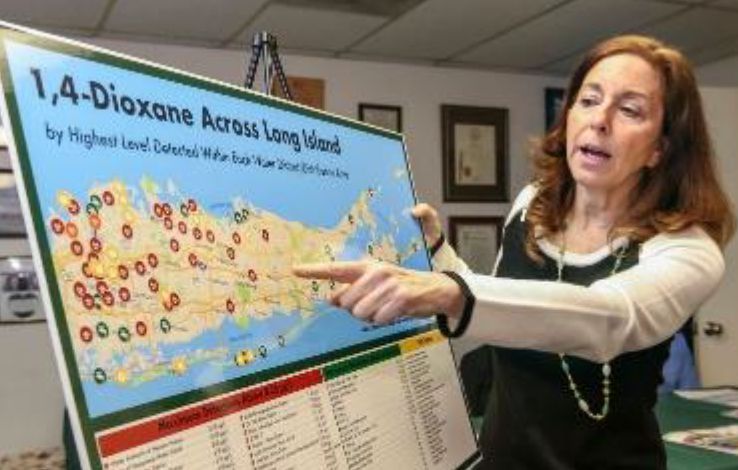Help CCE build on our success, and support our campaigns to protect public health and the environment in NY and CT. Make a contribution today.
Highlights
Victories! Environment Wins Big in NY Special Legislative Session
Several of our priority bills were passed by the NY Senate and Assembly this July during a special session of the legislature. Governor Cuomo has already signed the bill closing the hazardous waste loophole into law, and we are working to ensure he signs all these crucial environmental bills:
Streams protection: Expands state protections to an additional 41,000 miles of important streams throughout the state.
Closing the hazardous waste loophole: Hazardous fracking waste will no longer be able to be sent to traditional landfills or wastewater treatment plants, which are ill-equipped to handle hazardous waste—threatening our health and water.
Banning TCE in products: Trichloroethylene ("TCE") is a solvent and used in paint strippers. It is also unnecessary, causes cancer, and regularly pollutes drinking water sources.
Stopping illegal dumping: Dangerous construction and demolition debris is all too often dumped in parks and open spaces, threatening our environment and public health. This legislation holds polluters accountable with significant increased penalties for illegal dumping.
Banning PFAS in food packaging: PFAS, a dangerous suite of chemicals that are harmful to public health, are widely used in food packaging to provide water and grease resistance. This bill bans these harmful—and unnecessary—chemicals in food packaging.
Banning glyphosate on state property: Glyphosate is a dangerous herbicide that is a probable carcinogen, is ubiquitous in our waterways, and is harmful to pollinators. This bill makes our state lands glyphosate-free!
Pilot project for Adirondack road salt reduction: The over-application of road salt is damaging ecosystems, harming aquatic life, and destroying drinking water sources. This project will develop best practices to protect the Adirondack Park, and ultimately expand statewide.
NYS Sets Nation’s Strongest Drinking Water Standards for Emerging Contaminants
After three years of hard work advocating for the NYS Department of Health (DOH) to adopt drinking water standards for the toxic chemicals PFOA, PFOS, and 1,4-dioxane, the DOH officially adopted strong, enforceable drinking water standards for these contaminants in July! The Maximum Contaminant Levels (MCL)—10 ppt for PFOA and PFOS, 1 ppb for 1,4-dioxane—are the toughest MCLs adopted in the US and will ensure that our tap water is treated for these toxic chemicals. In fact, NY is the first state to set a 1,4-dioxane standard, and we look forward to seeing other states do the same!
Happenings
Working to Improve CT’s Bottle Bill
As part of our continuing campaign on Connecticut’s Container Deposit Law (aka “the Bottle Bill), we participated in the CT Recycler’s Coalition presentation about challenges and solutions for modernizing Connecticut’s Bottle Bill. Some important steps we could take include: increasing the deposit value from 5 to 10 cents, and expanding the deposit to juices, teas, sports drinks and other non-carbonated beverage containers. After creating a comprehensive stewardship program for beverage container recycling, Oregon and B.C. Canada have achieved redemption rates between 80-90% on covered containers (as opposed to CT, which lingers just over 50%). Stay tuned for more information on how you can help push CT to successfully modernize its Bottle Bill.
Big News for Offshore Wind
In July, Governor Cuomo announced the largest combined clean energy solicitation ever introduced in the US. NY's offshore wind projects seek up to 2,500 MW (the largest in the nation's history), and could bring NYS halfway to our offshore wind goal of 9,000 MW by 2035 (when combined with previously approved projects). While New York has once again proven to be a leader in combating climate change, our neighbors in Massachusetts are also making an important stride towards offshore wind. The nation’s first large-scale offshore wind farm (the US has one small project in operation off Rhode Island), Vineyard Wind 1, could be approved by the end of this year. Last month, we submitted public comments, worked with coalition partners, and garnered emails from NY and CT residents in support of the project. We will keep pushing federal leaders to give the final approval for Vineyard Wind 1 by the end of 2020 and make large-scale offshore wind a reality for the US.
U.S. House Takes Big Step Forward for Clean Water
As we continue our campaign to urge the U.S. to support a green economic recovery from the devastating impacts of the pandemic, the U.S. House stepped up with a strong budget for FY 2021 that supports clean water and jobs. The House-passed a budget that includes major funding increases for the Great Lakes restoration, upgrades for wastewater and drinking water infrastructure, and lead drinking water line replacement. We are now urging the U.S. Senate to follow suit!
Protecting Suffolk County NY’s Land Preservation Program
Suffolk County’s land preservation program, which began in the late ‘80s, has been the most important water quality protection initiative in the county’s history (protecting important open spaces is critical to protecting water quality). Due to current budget shortfalls from the Covid-19 pandemic, the Suffolk County Executive proposed putting forth a ballot initiative that would have allowed the county to raid funds from the land preservation program. This pandemic highlighted the importance of our parks and open spaces, and we fought hard in opposition to the potential decimation of one of the county’s pivotal environmental programs. Last month, the Suffolk County Legislature and County Executive decided to withdraw the legislation and keep this landmark program intact!



























